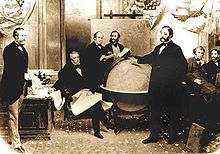“Punting the Pundits” is an Open Thread. It is a selection of editorials and opinions from around the news medium and the internet blogs. The intent is to provide a forum for your reactions and opinions, not just to the opinions presented, but to what ever you find important.
Thanks to ek hornbeck, click on the link and you can access all the past “Punting the Pundits”.
The Sunday Talking Heads:
Up with Chris Hayes: Chris guests for Sunday:
Rep. Carolyn Maloney (D-NY) (@carolynbmaloney), chair of the Joint Economic Committee; Alexis Goldstein (@alexisgoldstein), member of Occupy the SEC and former Wall Street information technologist; Kai Wright (@kai_wright), editorial director of Colorlines.com and an Alfred Knobler Fellow of The Nation Institute; Karen Ho, author of Liquidated: An Ethnography of Wall Street and associate professor of anthropology at the University of Minnesota; John McWhorter, Columbia University professor of linguistic and American studies and contributing editor at the New Republic and TheRoot.com; William Black (@williamkblack), associate professor of economics & law at University of Missouri – Kansas City and author of The Best Way to Rob a Bank Is to Own One; and Richard Benjamin, senior fellow at Demos and author of Searching for Whitopia: An Improbable Journey to the Heart of White America.
This Week with George Stephanopolis: Rep. Paul Ryan (R-WI), and Rep. Chris Van Hollen (D-MD), who will debate health care, the budget, and the 2012 presidential race.
The roundtable guests are George Will, conservative commentator Ann Coulter, former White House environmental advisor Van Jones, author of “Rebuild the Dream,” Matt Bai of The New York Times Magazine, and “Nightline” co-anchor Terry Moran.
Face the Nation with Bob Schieffer: Starting this Sunday Face the Nation expands to a one hour format.
Mr Schieffer’s guests are Vice President Joe Biden; GOP presidential candidates Newt Gingrich and Ron Paul; and Romney campaign adviser Kevin Madden. CBS News political correspondent Jan Crawford and political director John Dickerson, along with PBS NewsHour and Washington Week’s anchor Gwen Ifill, will discuss the 2012 presidential race and the Supreme Court’s hearings on the Affordable Care Act.
The Chris Matthews Show: This week’s guests are Dan Rather, HDNet Global Correspondent; , NBC News Justice Correspondent; Nia-Malika Henderson, The Washington Post National Political Reporter; and Kathleen Parker, The Washington Post columnist.
Meet the Press with David Gregory: Mr. Gregory’s will ave interviews with GOP presidential candidate Rick Santorum and Sen. Charles Schumer (D-NY).
The roundtable guests are Tom Friedman and David Brooks of the New York Times, Fmr. Newsweek Executive Editor Jon Meacham, Fmr. Rep. Harold Ford (D-TN) and MSNBC’s Mika Brzezinski.
State of the Union with Candy Crowley: Ms. Crowley will have interviews with Senate Minority leader Mitch McConnell (R-KY); Rep. Paul Ryan (R-WI); House Intel Chair Mike Rogers (R- MI) and Ranking Member C.A. Ruppersberger (D-MD); and round table political discussion with the New York Times‘ Jeff Zeleny and CNN Sr. Congressional Correspondent Dana Bash.

 Welcome to the Stars Hollow Health and Fitness News weekly diary. It will publish on Saturday afternoon and be open for discussion about health related issues including diet, exercise, health and health care issues, as well as, tips on what you can do when there is a medical emergency. Also an opportunity to share and exchange your favorite healthy recipes.
Welcome to the Stars Hollow Health and Fitness News weekly diary. It will publish on Saturday afternoon and be open for discussion about health related issues including diet, exercise, health and health care issues, as well as, tips on what you can do when there is a medical emergency. Also an opportunity to share and exchange your favorite healthy recipes. 
 On this day in 1776, future first lady
On this day in 1776, future first lady  Russia was in a difficult financial position and feared losing Russian America without compensation in some future conflict, especially to the British, whom they had fought in the Crimean War (1853-1856). While Alaska attracted little interest at the time, the population of nearby British Columbia started to increase rapidly a few years after hostilities ended, with a large gold rush there prompting the creation of a crown colony on the mainland. The Russians therefore started to believe that in any future conflict with Britain, their hard-to-defend region might become a prime target, and would be easily captured. Therefore the Tsar decided to sell the territory. Perhaps in hopes of starting a bidding war, both the British and the Americans were approached, however the British expressed little interest in buying Alaska. The Russians in 1859 offered to sell the territory to the United States, hoping that its presence in the region would offset the plans of Russia’s greatest regional rival, Great Britain. However, no deal was brokered due to the American Civil War.
Russia was in a difficult financial position and feared losing Russian America without compensation in some future conflict, especially to the British, whom they had fought in the Crimean War (1853-1856). While Alaska attracted little interest at the time, the population of nearby British Columbia started to increase rapidly a few years after hostilities ended, with a large gold rush there prompting the creation of a crown colony on the mainland. The Russians therefore started to believe that in any future conflict with Britain, their hard-to-defend region might become a prime target, and would be easily captured. Therefore the Tsar decided to sell the territory. Perhaps in hopes of starting a bidding war, both the British and the Americans were approached, however the British expressed little interest in buying Alaska. The Russians in 1859 offered to sell the territory to the United States, hoping that its presence in the region would offset the plans of Russia’s greatest regional rival, Great Britain. However, no deal was brokered due to the American Civil War. On this day in 1951,
On this day in 1951,  On this day in 1979,
On this day in 1979,
Recent Comments